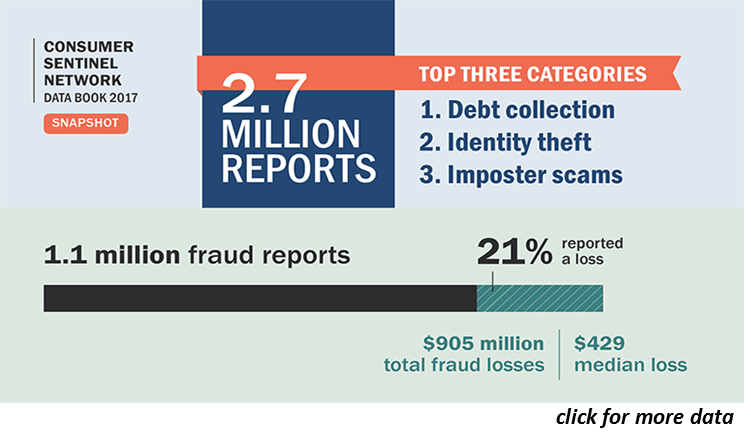Once bitten, twice shy. That fundamental principle of human behavior is why reputable businesses that work hard to earn consumers’ confidence should support the FTC’s ongoing efforts to fight fraud. According to the FTC’s 2017 Consumer Sentinel Data Book, consumers reported losing a total of $905 million to fraud last year. That’s close to a billion bucks people won’t be able to spend on legitimate products and services from credible companies.
That figure is up $63 million from last year, although the total number of reports received from consumers is down from 2.98 million in 2016 to 2.68 million in 2017.
 Topping the list that no industry wants to be on is debt collection, making up 23% of the total number of complaints. But there are two caveats: 1) that number is down from 2016; and 2) the high number of debt collection reports was due in part to reports submitted by a data contributor who collects complaints via a mobile app.
Topping the list that no industry wants to be on is debt collection, making up 23% of the total number of complaints. But there are two caveats: 1) that number is down from 2016; and 2) the high number of debt collection reports was due in part to reports submitted by a data contributor who collects complaints via a mobile app.
Second on the list is identity theft at 14%. The injury to consumers came in two equally unpalatable flavors. Credit card fraud was the most common manifestation. Tax fraud was next, but the glimmer of hope there is that the total number of tax-related identity theft complaints fell by 46%.
Winners of the dubious bronze medal were imposter scams, with consumers reporting financial losses of a whopping $328 million. Imposters wear many masks: “I’m with [big-name tech company] and your computer is riddled with viruses,” “Help, Grampa! I’ve been arrested and need bail money,” and “We’re from [government agency] and we’ll arrest you if you don’t pay us today.” Nearly one in five consumers who reported an imposter scam said they lost money to the fraud.
For the first time, the Consumer Sentinel Data Book breaks out fraud losses by reported age groups and here’s a result that may surprise you: Consumers in their 20s reported losing money to fraud more often than those over 70. Among 20-somethings who reported fraud, 40% said they lost money. Compare that with the over-70 crowd, only 18% of whom reported a financial loss. But there’s a troubling aspect to that surprising factoid. When older adults did report losing money to a scammer, the loss was much greater. For example, people 80 and older reported median losses of $1,092 compared to $400 for those in their 20s.
Wire transfers continue to be scammers’ preferred payment method and in 70% of the complaints we received, the fraudster contacted the consumer by phone.
The top states for reporting fraud were Florida, Georgia and Nevada, while Michigan, Florida and California had the most reports about identity theft, per capita. Stats cats tell us that they find our state-by-state data dive helpful, so we’ve created a new webpage to make it easier to evaluate the information.
The bottom line for business people:
- Educate. Use your status in the community to spread the word to employees, industry colleagues, and friends about the latest forms of fraud. One way to stay in the know: Sign up for scam alerts from the FTC.
- Cooperate. If people you know suspect that their identity has been compromised, send them to identitytheft.gov to create a personal recovery plan. (And remember that your company may have a legal obligation to provide identity theft victims and law enforcers with transaction records related to ID theft.)
- Report. When you spot a scam, report it to the FTC. We’re talking about fraud directed to consumers and questionable promotions targeting small businesses. Your reports have helped the FTC and other law enforcement agencies put together cases against the con artists behind bogus business directories, office supply flimflams, and other forms of B2B fraud.
Consumer Sentinel is an online database available to civil and criminal law enforcement agencies across the country and around the world. Although non-government groups may contribute data, only law enforcement agencies can access the information.

In reply to Why has AT&T not hired by Ernesto Elio V…